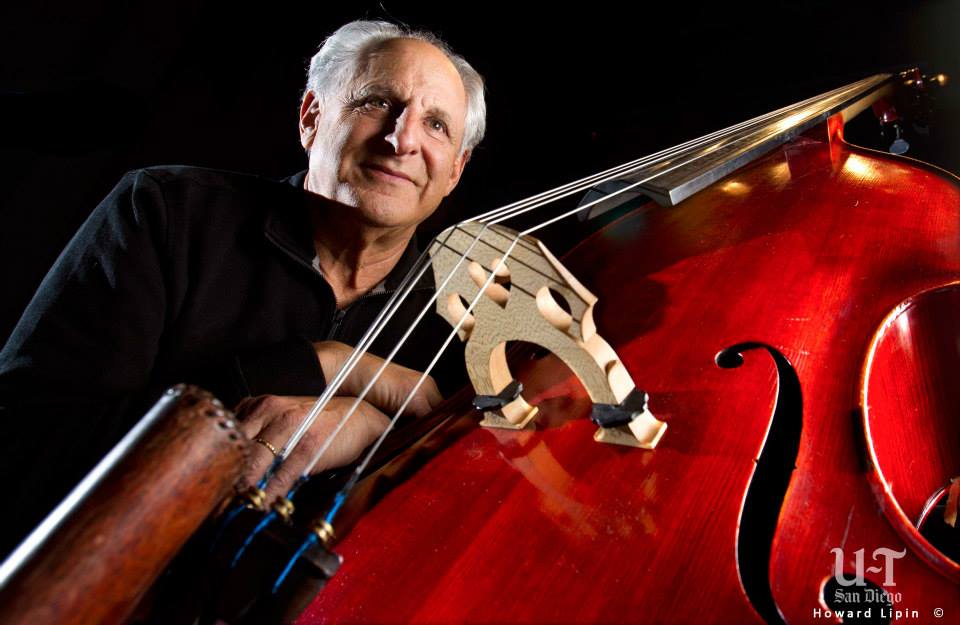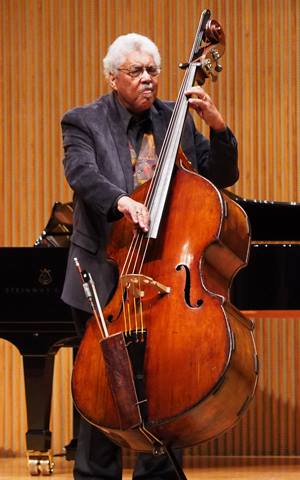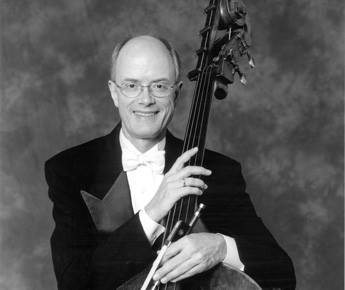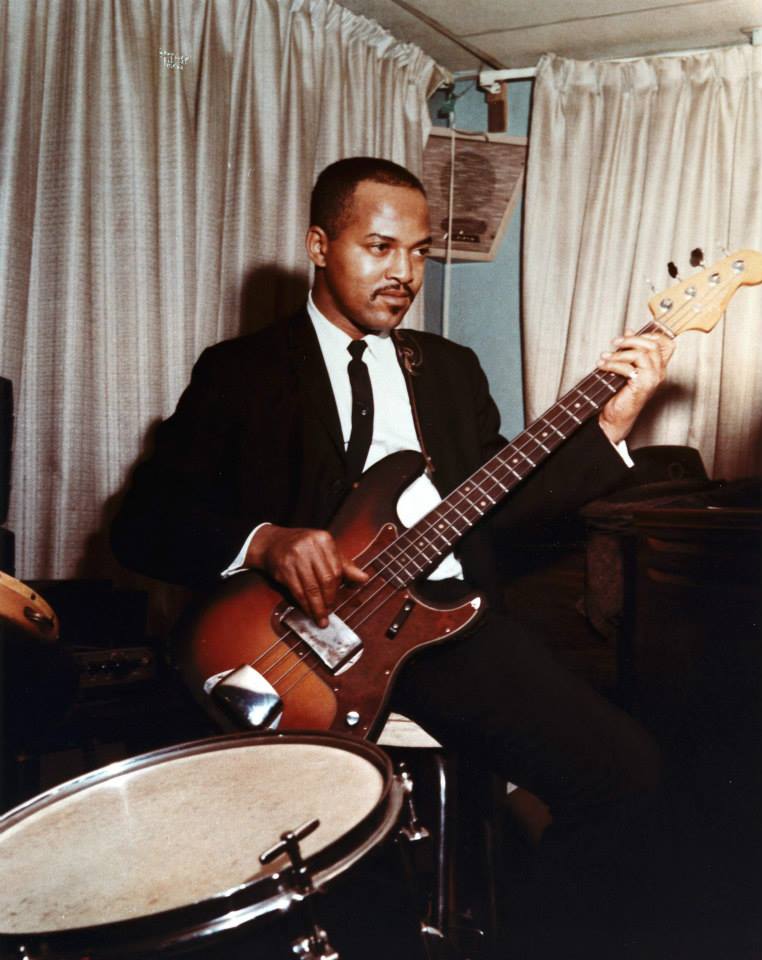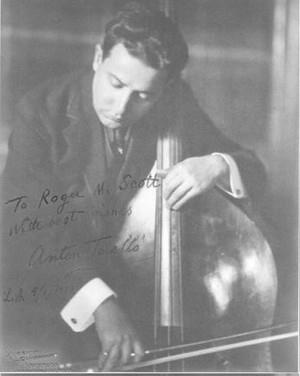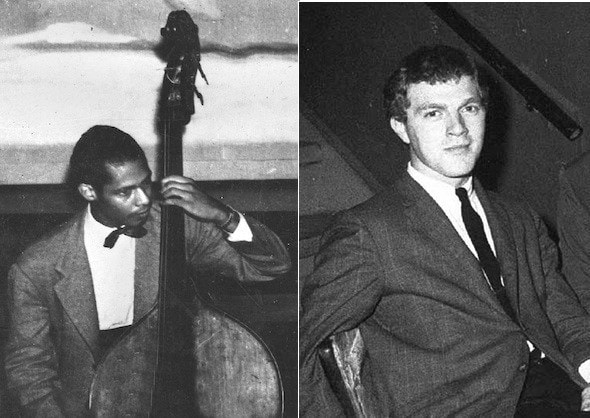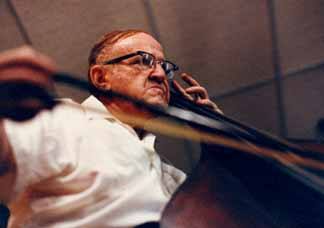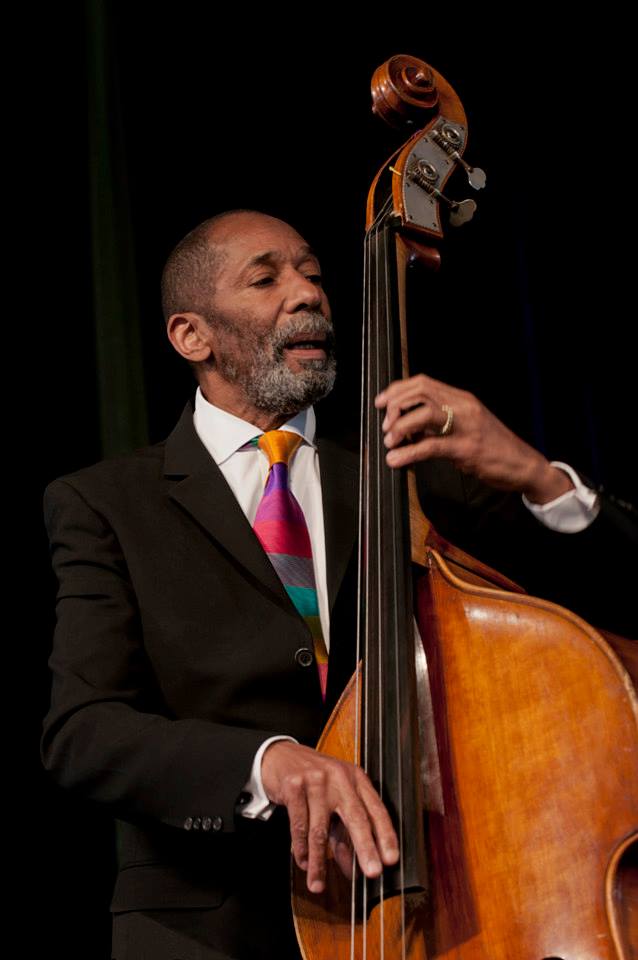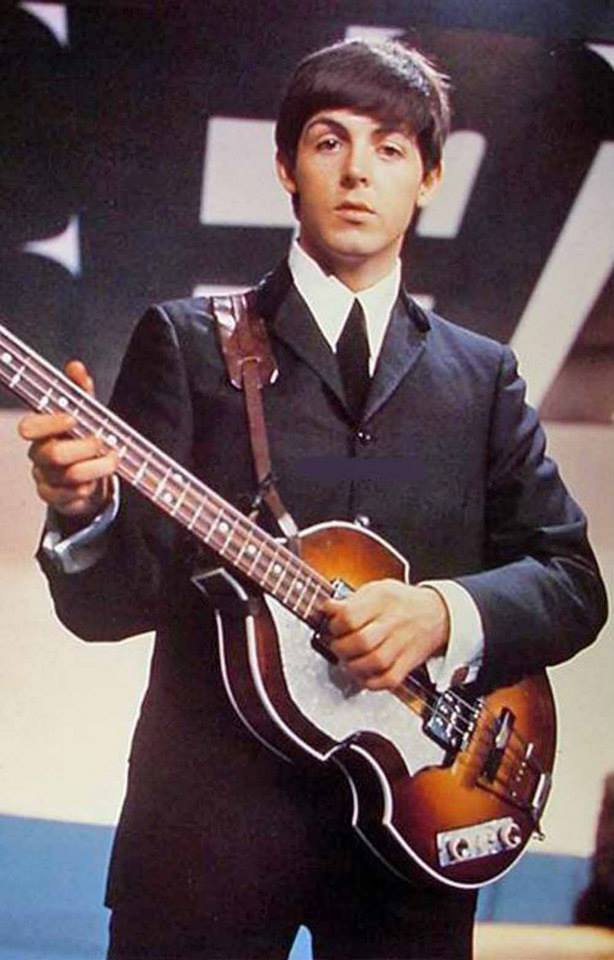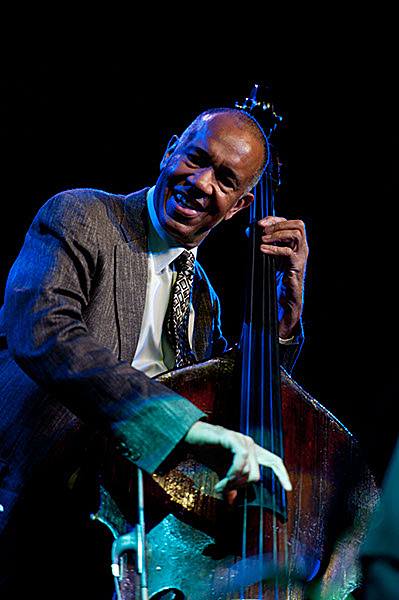The Fifty Greatest Bassists of All Time.
written 2015, revised 2019
I thought I would start posting a list of the 50 greatest bass players of all time, from all musical genres. Simple enough eh? The criteria are as follows, in this general order:
1. Technical mastery
2. Originality of style
3. Influence on the bass world through playing
4. Influence on the music world in general.
5. Influence on me
6. Versatility
7. Compositional skill and influence
8. Desirability/hireability as “the bass player”
9. Influence on the bass world through teaching
10. Longevity of career
11. Influence on the brotherhood of bassists
12. My personal preference. (It's my list you know)
I thought I would start posting a list of the 50 greatest bass players of all time, from all musical genres. Simple enough eh? The criteria are as follows, in this general order:
1. Technical mastery
2. Originality of style
3. Influence on the bass world through playing
4. Influence on the music world in general.
5. Influence on me
6. Versatility
7. Compositional skill and influence
8. Desirability/hireability as “the bass player”
9. Influence on the bass world through teaching
10. Longevity of career
11. Influence on the brotherhood of bassists
12. My personal preference. (It's my list you know)

#51 Jane Little. You probably haven't heard of her, but you probably have heard her play. For criteria #10, she is the easily on the list so I just had to squeeze her in here. 2015 marks her 70th year with the Atlanta Symphony Orchestra. Yes, I said SEVENTIETH year. Assuming 150 to 200 performances a year, she's been the "bass player" for more concerts than just about everyone else on this list, maybe combined. If I last half as long in my orchestra as she has in hers, I'll consider that just about as good as I can do. 35 years will put me to 2023 at age 62. After that, I just hope to stay alive. EDIT: Jane died onstage during her retirement concert shortly after this was written.

#50 Bertram Turetzky. A master player, teacher, and commissioner of music. There are few styles of music that he has not at least dabbled in as either a player or impresario. His students have even invented a few new ones, and they in turn are now spreading his innovative spirit forward yet again. His advice to me when I auditioned for him when I was 16, paraphrased from a comment below was, "Don't compare yourself to anyone else. Only compare yourself to yourself yesterday." This is something that I have always utilized and tried to pass along to artists of all genres.

#49A Billy Sheehan, and #49B Michael Peter Balzary. (Flea), I COULD HAVE WRITTEN THE SAME ARTICLE ABOUT SHEEHAN AS I DID FOR FLEA, SO PLURALIZING. Denizens of a genre of music that doesn't particularly view perfecting one's instrumental technique as a high priority. They, on the other hand, are master technicians. Worldwide presences, they combine, yes, perhaps overly flashy playing with a tremendous grooves. Maybe Flea a bit funkier than Sheehan. Admittedly, there are other genres of music that I have placed higher up on my list of what I should be spending the limited time I still have in life, ever-educating myself about. Nevertheless, I feel compelled to include them because of their influence over those thousands (millions?) of rock bassists who might need (or could use) inspiration to view the instrument as something much more than a chord "rooter." It's one thing to make the easy look difficult. What Flea and Billy have in common with the best jazz and classical musicians is that they can make the difficult look easy.
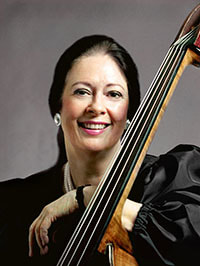
#48. Orin O'Brien. She wasn't on the list when I first started, but I decided to bump John Paul Jones for this iteration. Orin has long been a hero to me, and to so many others. The first woman in the New York Philharmonic, she inspired so many women double bassists from a certain era. 52 years, and counting in the Philharmonic, with the previous 10 before that at New York City Ballet, (where she was one of several women players) means that her now 62 year career is of the formidable/untouchable nature.

#47 Fred Zimmermann. (1906-1967) A member of the New York Philharmonic in the early to mid 20th century, he was the most important teacher of his day. As far as teacher go, he OWNED New York. Among his students: David Walter, Orin O'Brien, Joseph Guastafeste, Eddie Gomez, Ted Flowerman, Martin Flowerman, and many many others. As a whole, they went on to create an entire school of playing that still has disciples to this day. My own dear teacher, David Walter spoke of him as one of the all time greatest of Juilliard faculty members.
Rumor had it that he would charge his private students only what they could afford to pay. Of course, he popularized the Simandl book that virtually all of us have used. Most importantly, perhaps, he wrote the famous "Red Book" of bowing exercises that is still relevant to this day. I think the original editions that are actually red may be collectors items by now. Why did the publisher change the color anyway?
Rumor had it that he would charge his private students only what they could afford to pay. Of course, he popularized the Simandl book that virtually all of us have used. Most importantly, perhaps, he wrote the famous "Red Book" of bowing exercises that is still relevant to this day. I think the original editions that are actually red may be collectors items by now. Why did the publisher change the color anyway?
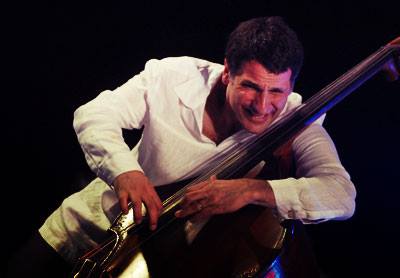
#44 John Patitucci. The highest level of virtuoso, and I say that without any hesitation or qualification, on both the electric and upright bass. A very rare feat. Many play both. Most aspire to his heights on just one. Enough said I think.

#43 Jon Deak. Plenty of us bassists consider ourselves composers. Jon, is truly one of the three or four deans of bassist/composers. (maybe Frank Proto and one or two others are in that category.) He has written well over 500 pieces, in all kinds of genres. They have been played by orchestras and chamber groups all over the world. His music is totally unique, incredibly colorful, yet always lyrical. He played with the NY Philharmonic on the second chair for decades in thousands of concerts. Then, he went to the inner city schools and taught children who would never otherwise be exposed to music how to compose. I'm talking young pre-teens. He arranged for the best pieces to be performed by the Philharmonic. I was lucky enough to be subbing with them during the first such concert. Those kids would remember that experience forever and their lives henceforward changed. I am proud to call this great man my friend and guru. When I was in High School, and the All-City High School Orchestra was lucky enough to play a concert with the New York Philharmonic, he was my stand partner. Meeting him that day, and hearing and feeling how the sound of his bass made the floor vibrate was THE seminal event in my decision to attempt to become a professional musician. Jon is also an accomplished visual artist and a super-duper mountain climber. Finally, no one has ever played "Valentine" better, or "Failing." (Except maybe Turetzky.)
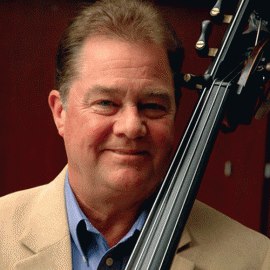
#41 Hal Robinson. Principal bass, over the course of his career, of two of the finest orchestras in the world, the National Symphony, and the Philadelphia Orchestra. Also, a master teacher. His students are principals and section members of many other orchestras. Probably only Paul Ellison's students, taken as a whole, are as equally successful in the symphony audition world. His lecture/demonstration where he easily tosses off just about every ridiculously hard bass audition excerpt, while keeping up a running commentary, is a tour-de-force. I know cellists and other musicians who are astounded by it.

#40 Enrique Diaz.(Kicho) (1918-1992) Astor Piazzolla wrote and named a piece after him. How many other bassists can lay claim to such an honor from one of the great composers of the 20th Century? (Yes, IMHO, Piazzolla was just that.) Maybe to this miniscule list we could add Ellington's tributes to Blanton. Also, the Argentine legislature bestowed upon him the title of Tango Bassist of the Century. I would venture that most other legislatures can barely even name another bassist, or even really know what a bass is.

#39. Red Mitchell. (1927-1992). Red was undeniably a great bassist. He did commercial work, but his true love was jazz and he always wanted to be faithful to her. He moved to Europe to be closer to her. He and she usually only socialized in small groups, but they say three's a crowd, so Red made his specialty amidst the smallest type of jazz group: the piano/bass or guitar/bass duo. Two's company, as the saying continues. I pronounce with no hesitation that he was the best duo bassist ever. I used to go see him EVERY time he visited New York. Usually at Bradley’s, and usually it was with Tommy Flanagan. Tommy and Red, WOW, that was a lot of music from just two instruments. He had a brother Whitey, who also played the bass, but Whitey wasn't as good. and he knew it, so he became a very successful television writer. Red always wanted to proselytize about tuning in fifths. He would tell me the Pirastro stock number for ordering those strings. He had that number memorized. I don't know if tuning in fifths had something to do with it, but the picture shows really well how he often played. Sul Tasto pizzicato, as it were. His right hand way far up from the bridge. Kind of like a tapping 6-string electric bass player. Also a poet, composer, and sometimes singer, if you haven’t already guessed, he was one of my all time favorites. I still miss him.

#38 Diana Gannett. Primarily known as a professor, her students populate the bass world as professionals, all around the real world. Over her career she has taught at multiples of the finest conservatories in the USA. I've only heard her play once or twice, but I was captured by the beauty and musicality of every single note. No talking during her solos. Only a truly great musician can leave such a lasting impression after so few hearings.

#37, Verdeen White. There are only a few on this list who have made their whole career with just one band. But what a band is Earth Wind and Fire. White is undoubetdly among the handful of the great electric bass funkmasters, but unlike most of the others, he usually doesn't concern himself with making the bass the focus of attention. He just keeps finding that "pocket." And I've always thought that he was largely responsible for that awesome EW@F groove. Check out "September." There are a couple of spots, where as a bass player, you will just automatically want to anticipate with an eighth note tied into the downbeat. Verdeen rests on that eighth, and plays the downbeat straight on. So subtle, but it adds SO much. Mind you, they've been touring pretty much non-stop for over 30 years. That's a lot of groove. And he's a pretty good dancer too, which is super rare for a bassist.

#36 John Beal. Many of you haven't heard of this guy, but make no mistake about it, there is no bassist in the world who has played for more performances and recordings than this superman. Let's count, shall we? He has pretty much always had a seat in a Broadway show. (8 performances per week x 52 = 416 a year). Back when there were jingles, he did at least one or two a day. (100-300 sessions a year? When I was a kid, I used to see him dragging an upright AND an electric and maybe an amp. on the subway between gigs.) Stokowski made him the principal bass of the American Symphony Orchestra in the 1960's and he still holds that position today. (15-20 concerts a year?) He has played on virtually every film score recorded in NY in the last few decades. (20-100 sessions a year?) He has also managed to squeeze in some jazz clubbing and recording here and there. If he is asked to do anything else, he does it at a high level. So over a 50+ year career, at an average, conservatively, of say 550 services a year, that comes to, oh gosh, close to THIRTY-THOUSAND GIGS?!? On top of that, he is a rosin and soundpost expert, and people consult him all the time about their setups. I have always loved this man. No doubt he is the king.

#35 Paul Ellison. Some master players are pretty good teachers. Some master teachers are pretty good players. Occasionally, a master teacher is a master player, and Paul Ellison is such a musician. He was the Principal bass of the Houston Symphony for over two decades. Recent years have seen him devote more of his time to teaching, as well as playing in the Tetons and with early music, and chamber music groups. I’ve personally never taken a lesson with Paul, but in researching this project, I read a LOT of biographies of a LOT of really world class bassists. I quickly started to see a recurring pattern. “Studied with Paul Ellison.” Over and over and over again! Here's another version of the same story: You can imagine that I meet a lot of young musicians. At least two or three times a year, I will hear a bassist play who highly impresses me. When I ask them about themselves, they, “Studied with Paul Ellison.” Just the other week, I loaned a bass to a member of the Mahler Chamber Orchestra, who was touring from Europe to Lincoln Center. I handed him the bass, and he started to play up a storm. He, “Studied with Paul Ellison.” Seemingly Paul is responsible for an entire generation of fine players, and they are all over the world, and they are gainfully employed in the top orchestras. You can’t deny that kind of success.
Edited with this addition on Sep. 3rd: After reading the wonderful, heartfelt tributes in the comments below, it makes me jealous that I don't know him better than I do. I look forward to changing that. Thanks everyone for your most welcome additions to this album.
Edited with this addition on Sep. 3rd: After reading the wonderful, heartfelt tributes in the comments below, it makes me jealous that I don't know him better than I do. I look forward to changing that. Thanks everyone for your most welcome additions to this album.

The 50 greatest bassists of all time. #34A and 34B. Leroy Elliot "Slam" Stewart (1914-1987) and Major "Mule" Holley (1924-1990) SEE ADDENDUM BELOW. Criteria #2 originality of style is king here. These guys are at the top of that list, no doubt. What they created is unique, except, there are two of them! Two Uniques? For a week now, I’ve tried to decide if I should rank one over the other, and realized that I enjoyed listening to them both absolutely equally. Now onto that style they shared. If you don’t know, what they did was that when improvising arco jazz solos, they sang along, note for note, sometime with doggerel lyrics, but usually just scat syllables. The old cliche about the audience talking during the bass solo never applied to either of these guys because it was so fascinating and interesting to listen. And, their solos were never cliche-filled, but well thought out complete musical lines. The old time jazzers used to have an adage that you should “tell a story” when you improvise. These guys did that at a level as high as some of the great horn players. They were also totally tops as sidemen, and between them played with dozens of big names. One of the highlights of my student life was when I was hanging out in the China Song, (remember that place?) with my dad one afternoon. Major Holley came in with a pile of bows with shredded hair (no cases.) He said he was on the way to the re-hair shop, but needed to stop in for a drink first. Hah! After writing this I realize that there is one tremendous difference between Slam and Major that is very important to point out. Slam used to sing an octave above the bass note, and Major sang at pitch. The world is a much poorer place since these two guys left.
ADDENDUM: Today, 9/16/15, Bill Merchant, luthier par excellence noticed that the cover photo of this album was taken at his bass shop in New York City in 1981. Mule was a regular client of his, and Slam was in for the picture. The bass in the center back was an early design of his vertical travel upright/electric basses.
ADDENDUM: Today, 9/16/15, Bill Merchant, luthier par excellence noticed that the cover photo of this album was taken at his bass shop in New York City in 1981. Mule was a regular client of his, and Slam was in for the picture. The bass in the center back was an early design of his vertical travel upright/electric basses.

#32. Christian McBride. Perfect technician and swing monster. Influential and brilliant jazz soloist. Great educator. Radio host, (including his unflappably cool interview with none other than Kareem Abdul Jabbar, yes, I was listening and I would have flapped.) Genius. Jazz history museum founder. Arranger. Awesome sideman, awesome bandleader. Harvard University President. Wait, strike that last one, at least for now, but it seems like he can do anything, and he probably has or will. Pretty sure that I will have just about complete 100% agreement on this choice. Enough said I think.

#31. Carol Kaye. According to Wikipedia, Kaye has played on an estimated 10,000 recording sessions. I generally don’t accept guitar converts as true bassists, but Carol was different; she literally wrote the method book. Back in the late 60s my dear mother was a nightclub singer. She took up the electric bass because her combo needed one. She had one of Carol’s books which probably helped more amateur bassists than any other. Reportedly, Sting read it too. It was the first bass book of any kind I personally ever laid eyes on and I studied it carefully, and my reading of syncopated rhythms improved. Urban legend has it that none other than Paul McCartney, listening to a recording of her (that he thought was Brian Wilson,) was so moved that he changed his own bass concept going forward. I surmise that Carol Kaye may have played with more famous acts and played on more hit records than anyone on this list, (except for one guy coming soon) Some of the big, big names of the bass world, and you know who they are, can’t quite make that claim.
PS: She was just about the ONLY woman playing a rhythm section instrument in those studios.
PS: She was just about the ONLY woman playing a rhythm section instrument in those studios.

#30 Frank Proto. I promised you more of the great deans of the bassist/composers. Here’s one from the top handful. Most of us mortals play the bass and dabble in composing. I would gather there is not a bassist alive who has not played a piece by Frank Proto. For any composer to get his music around the world in his own lifetime is a super-rare achievement. Frank has done it with piece after piece after piece, mostly for bass, but also for orchestra, opera, and other chamber ensembles. We will never know the amount of commercial and jazz arranging he has done. Trust me, it’s a lot. Frank is also a killer player. He was a member of the Cincinnati symphony for decades. And, he is one of the most successful businessmen among us with his Liben music company. I was privileged to be a part of one of their publications when he asked me to write a 90th birthday piece for our dear teacher, David Walter, which he published in an album of works by other fellow Walter students. The François Rabbath premieres of Frank’s concertos written especially for him have been watershed moments in bass history. About the best thing that I personally can say about Frank, is that he doesn’t categorize music in genres. His compositions draw from classical, jazz, folk, world music, etc. That is something I have aspired to. To paraphrase Duke Ellington, "there are only two kinds of music, the music that sounds good, and the music that doesn’t sound so good." Frank’s music is all in the first category.

#29. Joel Quarrington. It seems to be “tuning in fifths weekend.” Red Mitchell yesterday, Joel today. I must admit I am not extremely familiar with this master’s playing other than some youtube videos I have thoroughly enjoyed. What I do know is that over the years, almost everyone I have met who has heard him has told me that he was one of the best players they themselves had ever heard. Hey, I don’t make this stuff up, and I don’t want this list to be all about my own tastes. The other astounding and completely unique thing about Joel, is that he has been a principal bass of major orchestras on both sides of the Atlantic. Toronto Symphony for many years, and now the London Symphony. As far as I know, very few bassists (principal and/or section) have crossed over from Europe to America. (The other direction was fairly common in the early 20th century.) Obviously, I am way more familiar with the American school of orchestral bass playing, but there are distinct differences; the extension vs. the five string for instance. Joel, with his tuning, really does fit in the middle. Yes, I know you will correct and educate me with plenty of other examples in the comments, but that is what we are here for right? (Yes, I know about Eugene Levenson.)
|
#27. Edwin Barker. Appointed principal bass of one of the greatest orchestras in the world at age 22. That should be all I need to say here! But there is more, so much more. By that age he already had been a veteran with a section job in the Chicago Symphony. He has premiered concertos by major composers. He is one of the most accomplished chamber music bassists in the world. He played the Kousevitsky concerto in honor of the 100th anniversary of the Boston Symphony. I personally heard him play what was one of the two or three finest recitals I have ever heard. He’s also had a ton of students who I am sure are going to “like” him like crazy here.
|
|
#26. James Jamerson. (1936-1983). I think it is safe to say that more people have danced to Jamerson’s bass lines than any other bass player in history; that is, if you have ever danced to: "My Girl," "I Heard it Through the Grapevine," "Since I Lost My Baby," "My Cherie Amour,” "Ain’t No Mountain High Enough," etc. etc. etc. Some say that he played on at least 30 number one hits (More than Paul McCartney?) and 70 R&B chart toppers. (Not to mention hundreds of other favorites.) He had his problems in life. His good years in Detroit didn’t span much more than a decade, and he didn’t seem to do well when he followed Motown to California. But Oh, the groovin' he left behind. No matter how “Classically Trained” us bass players are, no matter what kind of music we play, if we can remember to always groove like Jamerson, we'll always be on the right track.
|
|
#24. Joseph Guastafeste. (1924-2014) 2017 EDIT: He's still alive. I freely admit I never knew Mr. Guastafeste, nor really ever heard him play, except as a member of the orchestra, but that doesn’t preclude his inclusion here. By any account, someone who was principal bass of just about the best symphony orchestra in the world, The Chicago Symphony, for 49 years, deserves a spot among this list AFAIAC. Before that, add close to 10 years as principal of the Dallas Symphony, and you have the longest serving orchestral principal bassist, AFAIK, in history! If there is a better criteria for inclusion, I don't know what it is. For an extra bit of good measure, add 2 more years before that as section player in the New Orleans Symphony.
As most good New York kids did, he studied with Fred Zimmermann. (#47 on this list.) Then on to Juilliard, and gainful employment while still a teen. Now if you know me, you know I’ll do just about anything and spare no expense for a laugh or a fun and clever idea; I once painted a Kay plywood bass white for Pete's sake! But Joe Guastafeste took this to extremes when he created the sculpture garden called Basshenge in Minnesota. It’s not really a joke, as it does have more spiritual meanings, and it is dedicated to musicians, artistry, and Stonehenge, but you can’t help smiling when you think about it. Here are a few other interesting things I learned while researching this article: He was a quiet man. His wife and he once donated an RV to PETA. He had specific instruments for specific kinds of music. He played a bass solo on a piece written by my man Rufus Reid. (#28). I’m sorry I never met this guy. I probably would have loved him. I look forward to reading some other things in the comments below, especially things I can steal and edit into this paragraph. |
|
#23A Jimmy Blanton (1918-1942) and #23B Scott LaFaro (1936-1961). I know I promised no more “Double” bassist posts, but as I thought about it, I realized how many parallels their lives had. Perhaps the conventional wisdom thinks of LaFaro as being from the modern age compared to Blanton’s more traditional jazz sensibilities? I don’t. LaFaro, as of this writing, died 54 years ago, and Blanton 73 years ago, which makes the 19 year difference between the two dates seem, at least to me, approaching insignificance. Both of these players had been recognized as revolutionary, fiery young cats, hungry to redefine their instrument’s role in jazz. Both, at the time of their deaths, had reached amazing highs in their short careers with the onset of what one would have presumed to become long associations with two of the all-time-greats of the music. In LaFaro’s case, with legendary pianist Bill Evans, and In Blanton’s case, with Duke Ellington, perhaps THE all time greatest of them all. These guys were already “raising the standards,” but they were able to pull out absolutely amazing things from the influence of their new mentors Ellington and Evans, who had taken them under their wings. This, unbelievably, pushed them both to even higher heights.
You know what? The parallels continue into their playing: They had super clean techniques, with a strong popping pizzicato sound; and liked to play on top of the beat which made the music of their bands practically jump out at the listener. That’s what I get from my listening. Do you agree? Both found creative ways to rise above the four-quarter-note-to-the-bar straitjacket, yet still accompany brilliantly when appropriate. And, most importantly for their legacies, both were stellar soloists, functioning more like horn players during their featured improvisations. Because of their tragic deaths, we can only imagine what kind of new and amazing directions either might have taken. In the 1950’s when LaFaro was coming up, what kind of sounds and techniques would he have developed had Blanton still been alive? It seems impossible, but Blanton, had he lived, would have only been 43 years old when LaFaro died. You don’t think he would have been a jaded fuddy-duddy by then, simply resting on his laurels do you? And LaFaro, had HE lived, would only have been about 44 when Bill Evans himself died! What would he have done with his career then? Sadly, we will never know. Perhaps this is the saddest story in the history of these 50 great bassists, or perhaps of all bassists. But on a happier note, because of their surviving recordings, it has been our wonderful fortune to still have their influence within our mutual psyche. I dare say there isn’t a bassist alive who hasn’t felt and internalized their influence, and there won’t be one for a good long time. |
|
#22. David Walter (1913-2003). This may be the most personal one for me. Dave was my teacher for about four years, and my stand partner in the orchestra for eight or nine. I first laid eyes on him when my grandmother dragged me to see the NYC Ballet. She was a balletomane and had front row season tickets. That was fine by me, as I knew I could watch the orchestra if the dance bored me, which it often did at the time. There he was, the erudite, avuncular looking personage who had stared out at me from my “Music Minus One” album when I was 15 years old. “What a serious minded man,” I thought. Years later I discovered that his actual personality was closer and more reflective of his wonderful sense of humor and his hyper-energetic drive to enjoy life. Into his 70s and even 80s he could be seen around New York City hurriedly herding a group of much younger, much slower students to a concert or an art exhibit. A child violin virtuoso, his immigrant Jewish parents did what all such parents do, and told him to think about a backup career. He got a degree in Mathematics from City College, back when it was free, and was producing more future Nobel laureates in engineering and sciences from just about any other college except MIT. Did I mention that he was one of the most brilliant people I ever knew?
Dave was principal bass of the Pittsburgh symphony, but had a daydream that two of the greatest musicians in the world would come out of retirement and summon him to work. Shortly thereafter, the first of these two, Arturo Toscanini did just that, and Dave performed in his great NBC Symphony. Concurrently, he played jazz and commercial bass in the early days of the Tonight Show with Skitch Henderson. No, Skitch wasn’t the other half of his daydream, Pablo Casals was, and in due course there was a festival formed in Puerto Rico under the direction of that master cellist. Dave spent much time there and befriended many of the Puerto Rican classical artists he performed with. Then, in the late 1950’s Dave became a member of the NYC Ballet orchestra, during the years when George Balanchine was creating the bulk of his masterworks. That’s three of the great geniuses of the 20th century Dave was lucky to be close to. In the meantime, he started a phenomenal teaching career at the Manhattan School of music and then Juilliard, that saw him become, during the 60s, 70s, and 80s, one of the premiere teachers in the country. Some of his first students were jazz players who needed to brush up on their legit chops in order to survive in the commercial studio world of New York. Some of these guys were name cats (maybe even on this list ) and knew Dave would be discreet. When I was a student, he and Homer Mensch were just about the top two choices for teachers in the east coast, except for maybe Roger Scott at Curtis. Dave also became part of a scene that was involved in new music. He composed a bit, and commissioned much. He was also a columnist for the American String Teachers Association. When the NBC symphony disbanded, Dave was a leader in establishing the “Symphony of the Air” as a continuing concern. Air, as in “on the air” in radio/TV speak of yore. I don’t know where he found the time. He loved the original Oak bass rosin, and when they went out of business sometime in the early 70s or so, he bought every cake he could find still in stock. He always joked that when he ran out he would retire. One of my most prized possessions that he presented to me when he actually did retire from playing in the late 1990’s is the last half-cake with a handwritten note saying something like, “Dear Ron, I’m finally running out of Oak, so the last bit is yours. Congratulations on a wonderful past and future career.” It was he who should have been congratulated more when he was still alive. For his 90th birthday, only a few months before he died, some of us former students threw him a concert. Frank Proto, Bert Turetzky, John Feeney, Tony Falanga and I played. I'm sure I'm forgetting some others. I think he was touched. |
|
#21 Ron Carter. For the most part, I am avoiding putting people here who, IMHO, are famous solely because they happened to be the bass player of one or two even more famous bandleaders. I considered and rejected several players who, while they are/were total pros, ONLY just did the workmanlike sideman job of the superstar leader. They shall remain nameless here; you can think of a few yourself. Ron Carter is another story. A lesser man might have gotten lost in the shadows of Herbie Hancock, Tony Williams, Wayne Shorter, and, above all, Miles Davis. Talk about a crowd of A-listers; make that A++listers. Not only did Ron help drive that group to greater heights, he managed to find an influential voice of his own. What is your favorite aspect of his playing? His growling sound? His laid back time? His clever use of dynamics? His creative voice leading and note choices? All of the above? Comment in detail below.
I’ve also tried to avoid, with a couple of exceptions, those players known only for their work with one group. Ron is again way, way up from that threshhold. After Miles, he played with an absolutely astonishing number of great jazzers. I’m not going to even attempt to name them. His recordings are numerous and often legendary. And exceedingly rare for a bassist he also became a leader in very innovative situations. He played something called a piccolo bass, (I've never seen one up close) with a rhythm section behind him. He also had a group where he played bass with a cello quartet. I’m sure there are others I don’t even know about. In his spare time he did a lot of commercial work, more than any of us can imagine. I once had the pleasure of holding open the door for him when I was leaving and he was entering Carroll's Music Rehearasal Studios. (On another matter, only a fellow bass player really knows how to properly hold open a door so as to not impede a double bassist's ingress or egrees [whilst schlepping] through a portal.) No matter if we admit it to ourselves or not, we are all influenced by Ron. |
|
When I was ten years old I would have put Paul McCartney on this list. When I was 20, 30, 40, and maybe even 50, I wouldn’t have put Paul McCartney on this list for various reasons, not that he needs to be on here. But now, on my 54th birthday, today, September 12, 2015, I again would, and hereby do so now 'cause maturity has certain benefits, one of them being able to see the high value in many of the different inner levels of artistry. I can’t possibly write anything new that hasn’t been said already about this most famous of all bassists, but, in looking through the previous names in this album, a couple of things come to mind. What may not be pointed very often is that before the Beatles came on the scene, with only a few exceptions, pop/rock acts didn’t play their own backing tracks. Carol Kaye (#31) and other studio grunts like her played on so many of those hits. The Beatles were among those bands who changed that scenario, and Paul was a big reason for that He had the necessary skills and talent. Afterwards, everyone played their own instruments. This kind of influence alone deserves his inclusion here.
Now don't you dare tell me that he was just another rock guitar convert. I know he self-identifies as a bassist. He told our bass section this personally when the NYC Ballet was rehearsing his "Ocean's Kingdom” a few years back. He was kind enough to have a short chat with us, “bass player, to bass players.” in his words. OK, let’s get it out of the way, yes, technical impressiveness isn’t his strength on the instrument, but hopefully we may all agree that McCartney is one of the two or three greatest bassist/composers of all time. His tunes, along with John Lennon's and the other Beatles' are so melodious, and so ingrained in our consciousness that we often forget about their bass lines. In many cases they are very interesting in their own right. Dear readers, fellow members of the (bass) academy: for your bass line consideration in this matter I proffer the following: “Taxman," "Come Together," “Rain," "I Saw Her Standing There”, "Dear Prudence," "Day Tripper," "I Want You," "Lovely Rita," "Maxwell’s Silver Hammer," "Everybody’s Got Something to Hide Except Me and My Monkey," "Ob-La-Di," "Something." Whew, I could keep on indefinitely, but I’m tired of typing quotation marks. And let’s not forget about his singing and multi-instrumentalizing. Absolutely one of the great singer/bassists. I know I am going to get into trouble for saying this, but sometimes when I hear a wonderful singer playing the bass, no matter how good the playing is, (and it often is excellent) I often wish they would just lose the bass and just sing. |
|
#19. John Clayton. So when I was about 16 or 17, I went to Disneyland. To my thrilled surprise, I discovered that appearing there that evening was none other than Count Basie and his Orchestra. Yes, Disneyland used to do that kind of thing; Woody Herman, and a lot of the other great bands showed up in the 1970s too. Anyway, imagine how excited I was, a young jazz fan and student musician getting to see the Count live for the first time. I immediately forgot about all the rides and things, and went to Carnation Plaza and got a good seat, right in front of the bandstand. I didn’t want to miss a single note. The Count was phenomenal; at the height of his powers. Just when I thought things couldn’t get any better, Basie announced that he was going to feature his hot young bassist, John Clayton in special arrangements written to highlight his amazing gifts. Well, I had never heard anything up close like this guy’s virtuosity. It was thrilling to see a bass being prominent in a big band. He played higher and faster than I ever imagined was possible on this instrument.
Now fast forward a few years. The next time I heard him play live, was during the final round of the bass competition at the Zimmerman/Mingus convention in 1981, which he won. His solo bass contrapuntal arrangement/improvisation of “If I Was a Rich Man,” (am I remembering this correctly?) was brave, creative, and infuriatingly wonderful, especially given the venue and audience full of other bass players. Then, proving that his bag of tricks was seemingly bottomless, John, I think uniquely amongst the panoply of Count Basie’s bassists, (and most other primarily jazz bass players) got a principal position in a symphony in Europe, and stayed there a number of years. Back from Europe, and it was immediately off to the races to the highest levels of the music business, mostly in the jazz world as a sideman, leader, arranger, orchestrator, impresario, producer, educator, etc. with a bit of commercial playing and arranging thrown in. Maybe only Christian McBride is as versatile, and even that genius hasn’t held a chair in a symphony. Incidentally, I personally got a chance to play at Carnation Plaza in about 1988, when the bass convention was in Los Angeles, and we had a massive 100 bass recital conducted by Mickey himself. (I was finally able to guiltlessly utter the line, "I see we have another Mickey Mouse conductor here.”) Pretty sure that John Clayton had a hand in those arrangements too. The historic theater, if you can call it that, was torn down in about 2012, but it lives in my memory forever with the sounds of the Count and Clayton. |
